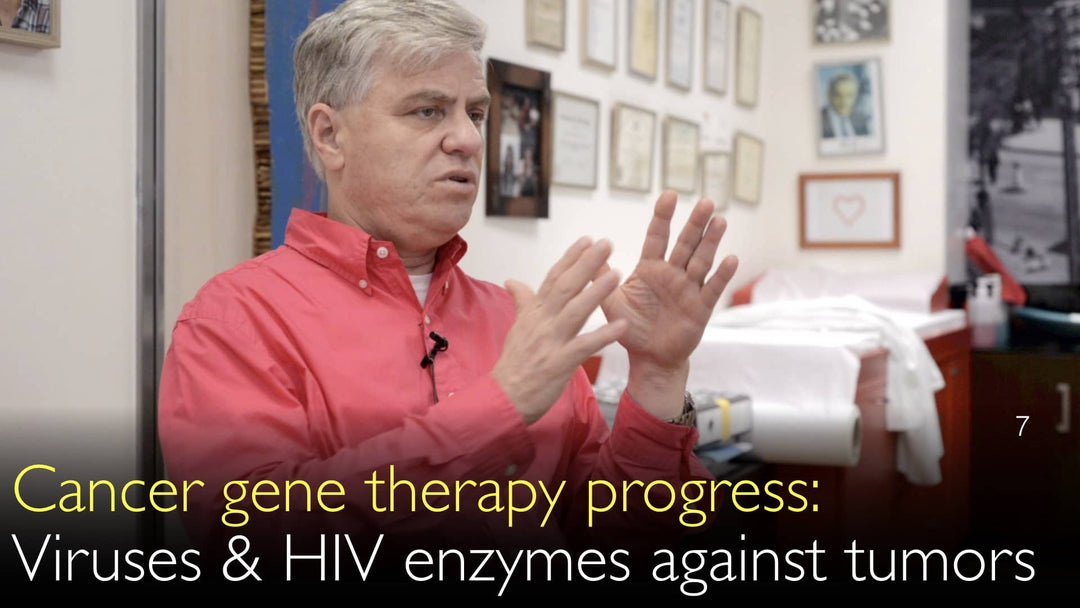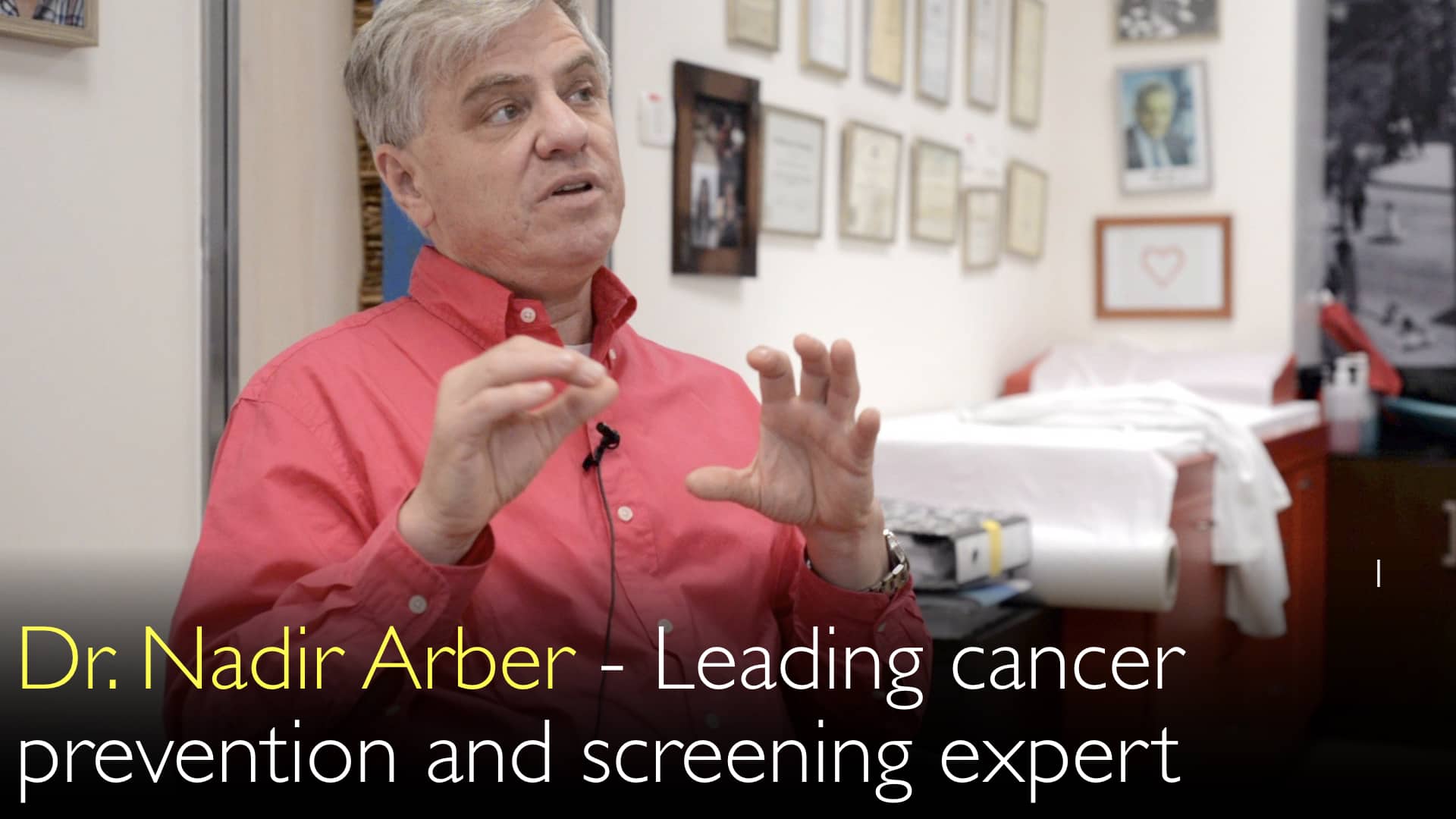מומחה הסרטן המוביל ד"ר נדיר ארבר, MD, דן בטכניקות טיפול גני חדשניות לסרטן המעי הגס, תוך שימוש בווקטורים נגיפיים ואנזימי HIV כדי לתקוף גידולים. גישה ניסיונית זו, המתוארת כ"אסטרטגיית סוס טרויאני", שואפת להרוג תאי סרטן באופן סלקטיבי תוך שמירה על תאים בריאים. ד"ר נדיר ארבר, MD, מסביר כיצד פלטפורמת הרפואה המותאמת אישית זו יכולה להיות מותאמת לסוגי סרטן שונים, ומציעה תקווה לחולים סופניים. הטיפול כולל זיהוי מסלולים סרטניים פעילים, אספקת גנים קטלניים באמצעות נגיפים, ושימוש בגנים מדכאי גידול להגנה על תאים נורמליים. ד"ר אנטון טיטוב, MD, מדגיש את הפוטנציאל של מחקר פורץ דרך זה לשנות את הטיפול בסרטן.
טיפול גנטי חדשני בסרטן המעי הגס: וקטורים נגיפיים ורפואה מותאמת אישית
קפיצה לפרק
- טיפול גנטי בסרטן המעי הגס
- אסטרטגיית הסוס הטרויאני בטיפול בסרטן
- וקטורים נגיפיים וגנים קטלניים
- פלטפורמת רפואה מותאמת אישית לסרטן
- אנזימי HIV בטיפול בסרטן
- עתיד הטיפול הגנטי בסרטן
- תמליל מלא
טיפול גנטי בסרטן המעי הגס
ד"ר נדיר ארבר, MD, חלוץ בטיפול גנטי בסרטן המעי הגס באמצעות וקטורים נגיפיים. טיפול ניסיוני זה מיועד לחולים סופניים, ומציע מוצא אחרון כאשר טיפולים אחרים נכשלו. הגישה כוללת אספקת גנים טיפוליים ישירות לתאי הסרטן, ומספקת אפשרות טיפול ממוקדת ויעילה יותר פוטנציאלית.
אסטרטגיית הסוס הטרויאני בטיפול בסרטן
ד"ר ארבר מתאר את "אסטרטגיית הסוס הטרויאני" כשיטה חדשנית למלחמה בסרטן. טכניקה זו מנצלת את מסלולי הגדילה של הסרטן עצמו כדי להחדיר גנים קטלניים לתאים ממאירים. על ידי כיוון למסלולים הייחודיים לתאי הסרטן, אסטרטגיה זו שואפת לעצור את גדילת הגידול תוך מזעור נזק לרקמות בריאות.
וקטורים נגיפיים וגנים קטלניים
וקטורים נגיפיים משמשים להעברת גנים קטלניים ספציפית לתאי הסרטן. ד"ר נדיר ארבר, MD מסביר כי וקטורים אלה מהונדסים להביע נוגדנים המזהים סמנים ספציפיים לסרטן, כגון CD24. זה מבטיח שהגנים הטיפוליים מופעלים רק בתוך תאי הסרטן, וחוסך תאים נורמליים מנזק.
פלטפורמת רפואה מותאמת אישית לסרטן
גישת טיפול גנטי זו מייצגת פלטפורמת רפואה מותאמת אישית שניתן להתאים לחולים בודדים ולסוגי גידולים. ד"ר אנטון טיטוב, MD מדגיש את ההתאמה של אסטרטגיה זו, המאפשרת התאמה אישית על פי הפרופיל הגנטי של הסרטן, ושיפור פוטנציאלי בתוצאות הטיפול.
אנזימי HIV בטיפול בסרטן
ד"ר ארבר חוקר גם את השימוש באנזימי HIV, ספציפית אינטגראז, בטיפול בסרטן. גישה חדשנית זו כוללת שימוש באנזים ליצירת שברים ב-DNA בתאי הסרטן, הגורמת לתגובה חיסונית המובילה למות התא. שיטה זו מנצלת את ההגנות הטבעיות של הגוף כדי לכוון ולהשמיד תאי סרטן באופן סלקטיבי.
עתיד הטיפול הגנטי בסרטן
הפוטנציאל של טיפול גנטי לחולל מהפכה בטיפול בסרטן הוא משמעותי. ד"ר נדיר ארבר, MD, וד"ר אנטון טיטוב, MD, דנים בהבטחה של טיפולים מתקדמים אלה לשנות את נוף האונקולוגיה. על ידי ניצול כוחה של הרפואה המותאמת אישית, טיפול גנטי מציע תקווה חדשה לחולים העומדים בפני פרוגנוזות קשות.
תמליל מלא
ד"ר אנטון טיטוב, MD: טיפול גנטי כ"קליע קסם" נגד סרטן captures the imagination. אך ההתקדמות הייתה איטית. מומחה וחוקר סרטן מוביל משתף רעיונות חדשים על ניצול נגיפים לטיפול בגידולים.
ד"ר אנטון טיטוב, MD: אתה עובד גם על טיפול גנטי לטיפול בסרטן המעי הגס. אתה משתמש בוקטורים נגיפיים. האם תוכל לדון בעבודתך בטיפול הגנטי בסרטן המעי הגס?
ד"ר נדיר ארבר, MD: כן, רק צריך להדגיש שזה עדיין ניסיוני. השבוע אנחנו הולכים לבצע טיפול גנטי על חולי סרטן המעי הגס הראשונים. אנחנו הולכים לתת טיפול גנטי לחולי סרטן סופניים. זה כמו טיפול רחמים. אנחנו הולכים למוצא האחרון של רחמים כי חלק מחולי סרטן המעי הגס הולכים למות אחרת.
ד"ר אנטון טיטוב, MD: לחולה אין מה להפסיד. יש הרבה תקווה. אבל הציפיות מטיפול גנטי לסרטן המעי הגס מאוד שמרניות. זה, שוב, אנחנו מנסים לחשוב מחוץ לקופסה.
ד"ר נדיר ארבר, MD: לפעמים יש תאים נורמליים שהופכים לתאים ממאירים. הם בדרך כלל יש כמה מוטציות. מוטציה אחת היא KRAS. תאי סרטן מתחלקים constantly והופכים לסרטן. These are not controlled divisions, very basically.
עם כימותרפיה או טיפול סרטן נוסף, אנחנו מנסים לעצור את המסלולים המולקולריים הפעילים האלה. הם הופכים תאים נורמליים לתאים ממאירים. Usually, cancer therapy leads to tumor growth arrest. תאי סרטן מפסיקים לגדול because this active cancer growth pathway was shut down.
Then after a while, the cancer finds some other growth-enabling pathways. Cancer growth bypasses this molecular pathway stop that was put into cancer. Now cancer resumes activity via other different molecular pathways. Usually, we have seen in a clinic. After cancer growth started again, then all of a sudden there is a rapid deterioration. The colon cancer patient dies quickly.
מה שניסינו במעבדה שלי הוא להשתמש בטיפול סרטן שונה. I call it the Trojan horse strategy. Instead of inhibiting these active cancer growth pathways that exist only in cancer cells, we are using cancer growth molecular pathways to specifically kill colorectal cancers.
What you use is the strategy that has five components. First, you have to identify these active cancer molecular pathways. Then you have to identify where the cancer pathway attaches to the nucleus. It is the DNA responsive elements. Sometimes cancer growth message comes from the membrane into the cytoplasm. Then the cancer message goes into the nucleus. It is telling the cells to divide.
We can hook to it, you can identify it, and we can hook a lethal gene to the message. It is going to be activated only in the cancer cells and not in the normal cells. In order to improve the strategy, we are using usually viruses to deliver a lethal gene construct into the cancer cells.
We want to selectively bring the gene therapy only to cancer cells. We are expressing on the top of the viruses specific antibodies to CD24. It is, as we spoke before, expressed in malignant cells but not in normal cells. The final component is that we are expressing very lethal genes that are based on the active cancer growth pathway.
We also have the antidote that is regulated by tumor suppressor genes. They are expressed in the normal cells but not in the malignant cells. We can keep the balance of just killing the colorectal cancer cells. As we know, there is also some "leak" in any biological system. We can express antitoxins in the normal cells. In that way, we can use even higher doses of gene therapy to selectively kill colorectal cancer cells. But at the same time, we make sure that healthy cells are going to stay alive.
ד"ר נדיר ארבר, MD: This is very promising gene colorectal cancer therapy. What is good about it? This is a gene therapy platform for many types of cancer. It's not just for any specific cancer. Because using this gene therapy strategy, you can change every part of it. You can adapt cancer gene therapy to the person or to the tumor. This is precision medicine at its best. It is very promising.
We are looking into the future. This may change the landscape of cancer therapy. And that's clearly the goal of every clinician and clinician-scientist. Absolutely!
Another cancer therapy clinical trial that we are doing now. It's taken a new medication that is used to treat HIV patients. It's using the integrase of the HIV virus. We are using this technology to treat cancer. It is a cancer therapy clinical trial we are starting now. It looks very promising.
ד"ר נדיר ארבר, MD: This is how we are using some viruses that were developed in my lab as cancer therapy. We specifically target cancer cells, and only the cancer cells. Viruses bring this integrase enzyme. It is causing cuts in the DNA. When there are a lot of cuts in the DNA, the immune system is going to recognize these cells as cancer cells. Immune cells will execute the program of cell death, apoptosis. That selectively kills cancer cells.
This is a fascinating new cancer therapy. That is thinking "outside of the box." Cancer gene therapy might give another hope for cancer therapy. This is certainly interesting. Because cancer gene therapy utilizes true precision medicine. Yes, that's the way!





